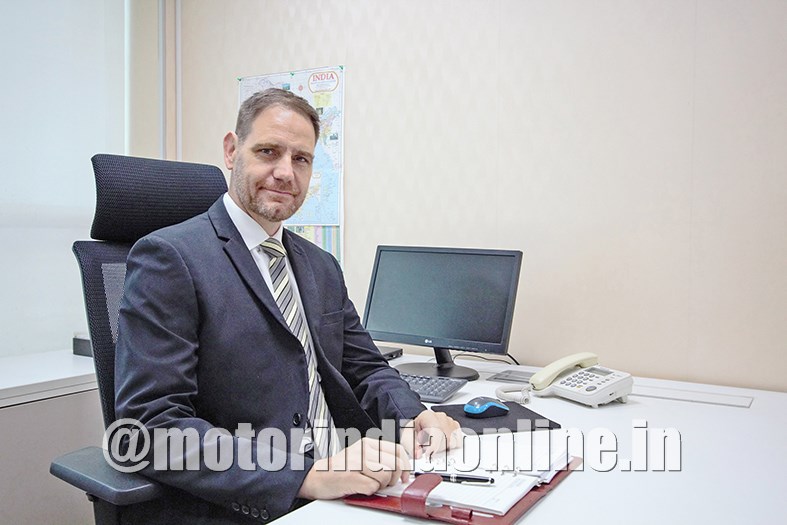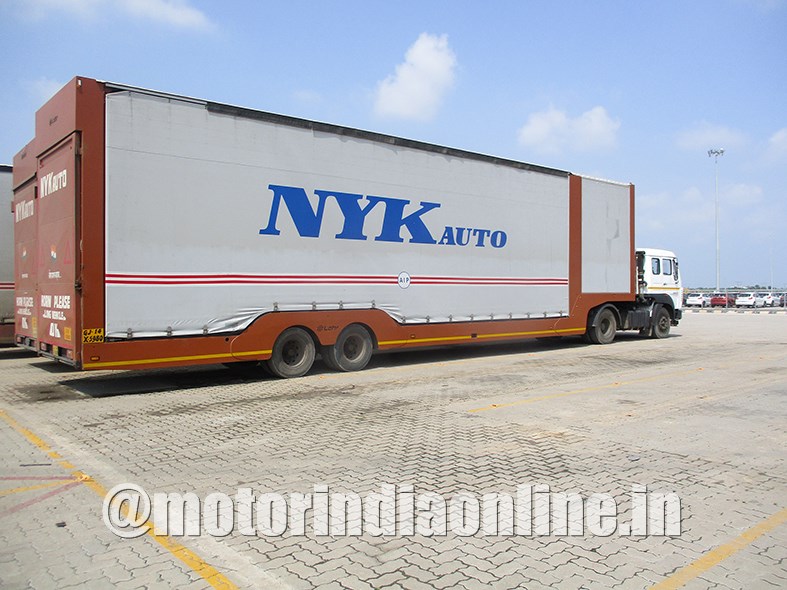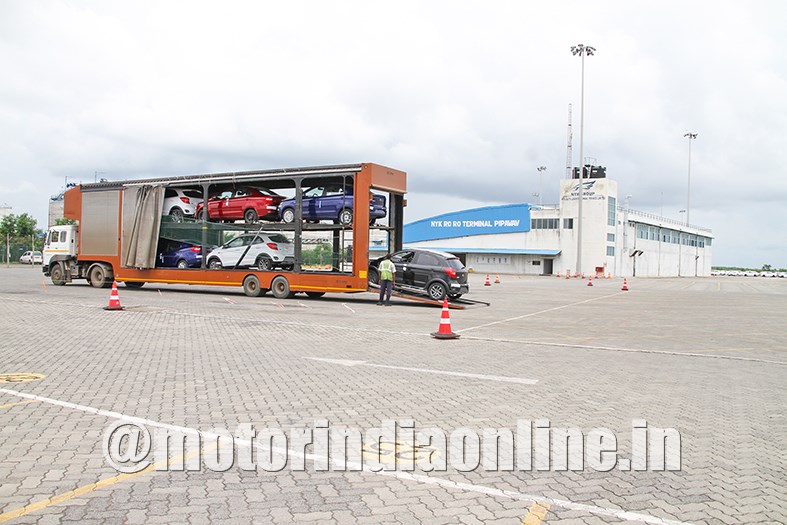Clint Carmichael, Executive Director, NYK Auto Logistics India Private Ltd., reveals to MOTORINDIA his company’s operational strengths in boosting end-to-end logistics in India. In this exclusive interview with Rajesh Rajgor he also talks about what the future holds for the logistics industry and how the company is geared to face new challenges

NYK Auto Logistics India (P) Ltd. (NALI) is an NYK Group company, transporting finished cars by car carriers, and handling the Group’s finished car-related business in India. The Japan-based NYK Group strives to meet customers’ needs in the expanding Indian market by drawing on the automobile logistics know-how and high-quality service that they have known and developed over the years around the world. Excerpts from the interview:
We understand that NYK Auto’s major expertise lies in transporting finished cars by car trailers in India and allied activities. Can you help us understand your business strengths and the value-added services you offer?
We have five core business activities:
1) Pre-delivery inspection and yard management at OEM’s sites which involves customer-specific inspection and maintenance for newly produced vehicles operating within the OEM’s storage yards, offering flexibility to either use customers’ existing yard management IT systems or our in-house custom-designed IT solutions.
2) Complete end-to-end integrated transportation solution for both exports and domestic distribution pan-India. NYK were the pioneers of introduction of LOHR trailers more than seven years ago which offered side curtains to assist with damage prevention and flexibility of load capacity.
3) Value-added technical services through a global team that is able to guide, design and implement various technical projects from terminal design to yard management layouts and industry best practices from our other facilities outside India.
4) Roll on-roll off (RORO) port or terminal operations: Our terminal facility in Pipavav provides a world-class facility specifically focusing on export vehicles being inspected and washed before being loaded on an export vessel. This facility has a state-of-the-art paint booth and as NYK Auto we are also providing stevedore services to all shipping lines calling at the port.
5) RORO ocean transportation: We have a solid reputation with more than 130 years’ shipping experience, an extensive global network and experience in operating the largest RORO fleet globally. We are therefore in a strong position to offer an efficient and reliable service to our customers. In addition, we are extremely focused on minimising our impact on the environment and have already adopted a variety of new energy-efficient technologies onboard our vessels.
NYK Auto Logistics India Private Ltd., an NYK Group company, has also established a joint venture company with Adani Logistics – Adani NYK Auto Logistics Solutions Private Ltd. that specialises in auto wagon rail movement. This will enhance our transportation offerings pan-India. Our first auto wagon rake will be delivered in October this year with an additional two rakes to follow in early 2020.
Since when has NYK Auto been active in India and what are the geographies within the country that you currently work in?
The company was originally established in January 2004 with a small fleet of 11 car carrier trailers. We expanded our operation in export-focused, value-added services with one major OEM involving pre-delivery inspections, washing of vehicles and carrying out minor repairs before units were shipped to overseas markets. We now own a fleet of 228 vehicles, operate in 11 OEM plant yards pan-India, operate in four ports across India, including Pipavav which is our own facility, and handle close to 2 million vehicles per year (includes terminal or ports, OEM plant yard movements, transportation on road, rail & units loaded onto Roro vessels). Our head office is based in Mumbai with five other satellite offices in the four major automotive clusters.
Could you please take us through the specific applications of your vehicles?
Apart from our 228 owned trailers, we also subcontract another 20-30 car carrier trailers to supplement peak dispatches. Out of the 228 vehicles that we own, 189 are conventional car carrier trailers, nine are car carrier trucks and 30 are curtain type trucks.
Where do you get the car carrier trailers made? Could you elaborate about the specification of the bodies and the materials used?
All car carrier trailer bodies are fabricated by local manufacturers – for example, tippers by Balaji and LOHR – which are manufactured to comply with CMVR regulations. We have our own internally created specifications for steel thickness, internal foam, hydraulics system, etc., for all newly fabricated trailers. Our newest trailers have all been manufactured by LOHR located in Pune which have side curtains that provide additional advantages over other steel-type carriers.
Do you have your own fleet maintenance yard or team? Which are your preferred brands for tyres, lubricants, etc.?
We operate various models; our trucks are all under annual maintenance contract and are maintained by the manufacturers’ on-site or off-site teams. Our conventional trailers are maintained by our in-house maintenance crew located in three different locations in India in the north, west and south. For our recently purchased LOHR trailers, we have started a unique custom-designed annual maintenance contract directly with LOHR to ensure specialised maintenance is available for our LOHR fleet. We have been using J K Tyre as our main supplier but also have procured tyres from Apollo and MRF. For lubes, we are using Mak lubricants from BPCL and Tata-specified oil in our truck heads.
Could you highlight a few safety measures that you have adopted to prevent accidents and ensure that your vehicles adhere to mandated requirements as laid down by the industry?
We have dedicated manpower that is specifically trained to load and unload car carriers with strong standard operating procedures entrenched. We have a centralised quality team led by our Japanese specialist responsible for standardised inspection standards and standardised loading applications. He also regularly audits all operations to ensure consistent quality and service delivery. We are in the process of setting up a centralised control tower to be able to centrally coordinate our trailer fleet by ensuring not only that our drivers are operating efficiently but that they are also getting adequate rest breaks. We have a dedicated training facility for new driver induction and ongoing training needs. Most importantly, NYK Auto Logistics is one of the few car carrier operators that are fully compliant in terms offering pension funds and ESI contributions.
Could you share with us your company’s initiatives to deal with driver shortage and measures you take to address the challenge in terms of hiring, training and retaining the driving community? How many drivers do you have on the roster? How big is your overall workforce?
This is a tough one and one that I believe both industry and government should be more aligned to address. However, as an organisation our starting point was to ensure that our drivers are fully compliant in terms of pension fund and ESI contributions, thus ensuring they are properly covered and have some savings following their retirement. We have a small facility where drivers can park, use the washrooms and get some rest, which we will continue to improve based on regular driver feedback and engagement. Whilst of course regular training is important to maintain safety standards and understanding of operations, our team regularly holds minor camps for health education that includes blood pressure monitoring, cholesterol checks, eye check-ups and HIV awareness, which have all been appreciated by our drivers. We currently have a total of 250 trailer drivers, 30 support staff for transportation and another 2,300 staff across other business units, which includes 2,100 drivers at OEM facilities.
Who are your major clients and how do you cater to their varied requirements? How do you allot or allot your fleet for the various requirements? Could you provide a few examples where you have added value by solving an existing problem or challenge?
In terms of customer base, we are effectively touching almost every OEM in India to ensure our fleet keeps moving with a diversified customer portfolio. We manage to transport close to 200,000 units per annum by allocating 50% of our fleet for export cargo and the rest for domestic cargo. To give you a case study, one of our customers wanted to have full visibility of their cargo from the time it was loaded until the time it reached the overseas’ buyer. By allowing NYK Group to handle their complete logistics chain from the OEM yard, our own trailer transportation, our own port facility on to our own vessel, we gave them an end-to-end solution with complete visibility along the way.
Could you give us an insight into your adoption of telematics and fleet management solutions to enhance operational efficiency?
We have been extensively testing two products – one based on onboard GPS and telematics and the other through mobile phone device which supports electronic proof of delivery and live tracking. We have been able to gather vital statistics as to how certain vehicles are performing, which drivers are performing well, and where certain bottlenecks are taking place on certain routes. We are now finalising on linking these into our operational software system to automate certain reports or alerts and billing information which will further enhance our operation costs and efficiencies.
What are NYK Auto’s medium to long-term growth plans?
There is a push from the government to ease traffic on the road and so we see some long-distance cargo shifting from road to rail as more capacity comes into the market. We will focus on this in the coming years and use our existing fleet to supplement or support our joint venture with their auto wagon rail business. With GST now having mainly been settled, we see some more consolidation of regional stockyards and we will look at setting up strategic storage yards as multi-user facilities which will also support rail-to-rail and rail-to-road for easy access to markets. As logistics providers, we are on constant guard looking for more efficient routes, quicker turn-around of our fleet and business diversity to ensure our assets are being utilised as much as possible.


